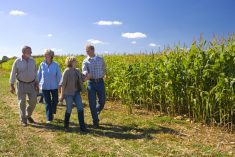It’s easy to see the two pincers coming together, at least when you look at farming from a national perspective. The average Canadian farmer is 55, on the one hand, and the average Canadian retires at 62 on the other.
But let’s put a best-case face on it. For self-employment Canadians — the category that includes farmers — the retirement age is slightly higher, on average about 66 years.
It isn’t much of a reprieve, though. It’s more a matter of whether the average Canadian farmer will retire in just seven years, or whether we might have the luxury of keeping them for 11.
Read Also

Five reasons why you avoid farm bookkeeping
Bookkeeping for the farm business might not be anyone’s favourite chore, but staying on top of it can help your farm access the funds it needs to grow.
But that, as we say, is from a national perspective. On each individual farm, it’s a unique story.
So what should you do? Should you retire early? Or, in today’s highly capitalized, highly technologized agriculture, can it make sense to keep your hand in the game?
Farmers are right in step with a growing trend towards delayed retirement. According to recent Statistics Canada reports, the number of employed people aged 55-plus has risen rapidly since the early 2000s, already making up a quarter of our workforce.
It’s a trend that is expected to continue given that the baby boom generation is more highly educated, pension benefits are flat to shrinking, and the labour market is tightening.
On the farm, though, the decision isn’t always all about you. Maybe, for instance, you have your doubts about whether junior is ready to take over the farm just yet (even though junior might not agree).
Or maybe you’ve lived this long with the goal of getting something useful done every day, and it’s not an easy habit to break. Or perhaps you wonder if it’s even possible to reinvent yourself as a non-farmer.
Or maybe you simply love what you do.
Whatever the reason, you aren’t alone. More and more of us are choosing to stay longer in the workforce, either continuing to work full time past retirement age, or cutting back to part time to ease ourselves out of our full-time careers. Others choose to do something completely different, such as volunteering or putting their skills and experience to good use as mentors for younger people starting their careers.
“Redirecting”
Dr. Suzanne Cook, a gerontologist and adjunct professor at York University has come up with the term “redirection” to describe the process of how people approaching retirement age are looking for new pursuits and a new direction where they can use their skills, talents and experience in a way that that energizes them.
It isn’t just farmers, Cook says. Instead, in a way, non-farmers are catching up with the ag conundrum.
“In our society, we’ve had this model of retirement since we created the pension plan, and we’ve always just been focused on that,” Cook says.
“The baby boomers are pushing back and saying, I’m looking for the next challenge, I see myself as an active person, and I want to be engaged in my community doing something.”
In fact, her research is showing a new focus for these former retirees. They don’t want to keep working forever, at least not at the same rate. And they don’t want to just sit on the porch or play euchre at the senior’s centre.
Instead, they’re focused on finding work that’s “rewarding.”
Maybe they’ll start a new business venture, or carve out a smaller role from their previous career. But just as likely, they may reconnect with former interests and passions that they haven’t had a chance to explore because they were too busy with career and family.
“It’s an opportunity to have the fulfilment that they put on the back burner,” says Cook, who has and continues to research redirection among adults age 50-plus. “People change direction and find what’s fulfilling, what’s challenging and meaningful to them. It’s not just paid work. They are doing volunteer work and deciding to get more involved in their local community and find their voice.”
Working beyond retirement
Other research from the United Kingdom is looking at some of the characteristics of people who choose to work past retirement across different industry sectors.
“What we are finding is that people who are working past the state pension age tend to be a self-selected group,” says Dr. Laurie Corna of the Institute of Gerontology at King’s College, London. “They are more advantaged in that they have higher levels of education, they’re less likely to work in certain manual routine labour, they’re more likely to be in the professional and managerial groups, and they tend to have more control over the kind of work that they do.”
“They’re better off financially and in better health, so there’s a real selection in terms of who is able to continue to work in later life.”
The Wellbeing, Health, Retirement and the Lifecourse (wherl.ac.uk) team that Corna works with conducted the study primarily to assess the health, financial and social implications of raising the retirement age. In the United Kingdom the state pension age — formerly 60 for women and 65 for men — is on a rising trajectory to age 68 by 2028.
“In the context of compelling people to work much longer, we asked the question, what are the implications of this massive change for health among older adults and for their economic well-being,” says Corna. “We are interested in some of the inequalities that could arise from these policy changes.”
Is working longer good for your health?
Although the study didn’t focus on people in agricultural roles specifically, the findings are still interesting from different standpoints, one of which is how experiences earlier in life shape the course of what goes on in later life.
“Agriculture is not just a job, it’s a way of life, and that’s very different from someone who is stocking shelves at a grocery store or working in a manual labour position in a factory where there’s repetitive work and they’re on their feet all the time and they’re more prone to musculoskeletal problems, sore back, and arthritis, and things like that,” says Corna.
“Farmers are a unique group,” Corna says, but she returns to the same point of departure. “We found that the groups who were benefiting from working longer and who were likely to work longer were a more privileged group… It’s a group that’s more likely to be higher up on the occupational scale.”
Not surprisingly, the study found that people who continue to work beyond state pension age because of financial reasons or were forced to retire because of ill health or redundancy had generally a poorer quality of life than those who either decided to work longer because they enjoyed working, or retired voluntarily because they wanted to spend more time with family or do other things.
Learning from outside agriculture
Cook had led a project called Redirection: Work and Later Life Career Development to examine the experiences of older Canadian workers (aged 50 and older) as they seek new employment through second or third careers.
The aim of the project, which was funded by CERIC (Canadian Education and Research Institute for Counselling) is to develop approaches, tools and resources for people working with older adults in the career development field.
As part of the Redirection project, Cook’s team developed a documentary video called Redirection: Movers, Shakers and Shifters which follows the stories of five adults from different industries and backgrounds who changed careers later in life.
Cook hasn’t done any research specifically looking at agriculture, but she does have some anecdotal evidence that farmers, too, are in some cases using redirection as a gentle path into retirement from the day to day activities of the farm.
For a number of years Cook, who lives just northwest of Toronto, was part of a Community Shared Agriculture (CSA) program run by a retirement-aged farm couple who had decided to switch to this model of farming so they could start mentoring others wanting to enter the industry.
They brought onfarm interns through the Collaborative Regional Alliance Farmer Training Program (CRAFT) in southwestern Ontario.
“As they aged, they kept things going with this model by continuing to train new farmers who were interested, but hadn’t grown up on a farm,” says Cook. “It was a definite transition from what they were doing before, and they relinquished some of their duties by doing the training and mentoring of these young people.”
The couple proved a wealth of information for the interns, and they continued in that role until their late 70s.
Although people choose volunteer roles as they transition careers later in life, others are choosing to mentor, and Cook sees huge potential for older workers to redirect their knowledge and experience for the benefit of younger people coming into any industry, agriculture included.
“No matter what career, I think we need more of that,” Cook says. “We need older workers sharing their experiences and details about their profession with younger people and networking with them and helping to open people’s eyes to opportunities.”
Cook is continuing her research and runs a consulting company that offers workshops to groups of individuals, organizations and businesses to help people find their redirection.
“My goal is to create an organization that can help people with this transition because I believe that there is a void. We’re not helping people with this transition,” says Cook. “We have been using the retirement model and it’s time for something new, and I think the baby boomers will be pushing that forward.”
Life choices, gender and more
It’s not as common as farmers might imagine for people to simply reach retirement age and retire, and there are some important health implications for both men and women when there is flexibility to make choices about when to retire.
In American studies, Corna points out, men who gradually retire, easing back from full-time work at 65 are least likely to have poor self-rated health.
For women, part-time work over the longer term also leads to better health. “For women, it’s not so much about the downshifts closer to retirement, but about having the flexibility to combine caring activities and work over the longer term that leads to better health later in the life course,” says Corna. “Why that is, we can’t really infer from the data, but we can make some educated guesses that it has something to do with the decades-old gender division of labour. Men are expected to be the breadwinners and women are expected to contribute to the household financially, but also do the caregiving, whether that’s for children, or other adults in their lives like siblings, spouses or parents.”
Corna adds there is debate in the U.K. about work being good for people’s health, and the assumption that having people work longer will raise the level of population health among older adults. “What we find is that good health is a common factor among those who decide to work longer, but that there is not a widespread health benefit of continuing to work past the state pension age,” says Corna.
There are also big differences in the United States and a lot of European countries when it comes to men and women’s work trajectories.
“For family caregiving reasons, early in their life course, women have much weaker attachments in the labour market and many of them carry that forward into later life,” says Corna. “So, in many countries, women predominate in patterns of work characterized by part-time work. For men, across the life course, continuous full-time employment is the norm. When we see departures from that, it’s often because they’ve retired early.”
For women, work patterns are more varied leading up to the state pension age. “A little less than one-fifth of women do work full time across their life course, but the majority have some combination of full- and part-time work with career breaks, so their histories leading up to retirement look quite different from men’s,” says Corna.
Another recent paper from the U.K. study suggests that earlier career choices can also affect frailty in later life, especially for women. “Women who take career breaks earlier in their life course, for time out to raise their children, are actually at a lower risk of reporting frailty in later life than are the women who worked full-time and maybe tried to do it all at the same time, which I think maybe isn’t surprising,” says Corna. “It’s interesting evidence that supports thinking more creatively about how we use our time in the context of increased longevity. From a health perspective, perhaps it’s a good idea for women to take a few years off while raising children and then re-enter the labour market, as opposed to expecting women to work full time and raise their children at the same time.”
Says Cook, “In Canada, there are also gender differences surrounding work and aging. For example, women tend to have lower incomes and pensions than men. This economic difference impacts people and continues to be a social concern. There is a shift happening around work and retirement for both men and women and, going forward, people will expect, anticipate and plan for a redirection during their 50s, 60s and 70s.”
















